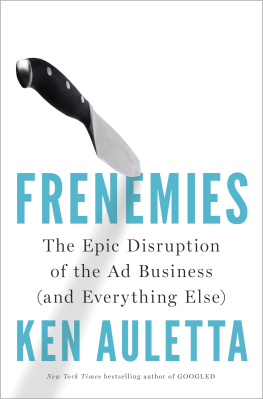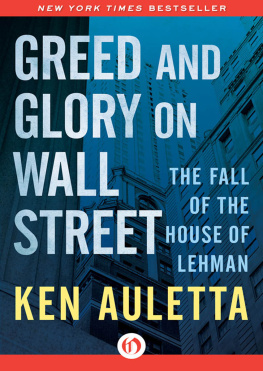
EARLY BIRD BOOKS
FRESH EBOOK DEALS, DELIVERED DAILY
BE THE FIRST TO KNOW
NEW DEALS HATCH EVERY DAY!

The Art of Corporate Success
The Story of Schlumberger
Ken Auletta

FOR KATE
CONTENTS
The breath had been so pumped from my lungs as I went up that at the top I could go no farther, and sat down at once.
Now you must free yourself from sloth, my mother said, for, sitting on down or lying under covers, no one comes to fame Therefore get up, overcome your panting with the spirit which wins every battle if it does not sink with its heavy body.
A longer stairs must be climbed; it is not enough to have left this one.
Dante, The Divine Comedy
INTRODUCTION
The first time I encountered the name Schlumberger or Jean Riboud was in the summer of 1981, which suggests either my ignorance or Schlumbergers low profileor both. I stumbled across this quiet giant while hunting a company to profile for The New Yorker magazine. Back then, the travails of the American auto, steel, and smokestack industries crowded the news, and the frequently asked question was: Why is American industry failing? I set out to explore the flip side of that question: Why do companies succeed?
The first few months were spent asking people on Wall Street and elsewhere two simple questions: Whats the best company in the world? And, whats the best company with an extraordinary chief executive?
I collected scores of candidates: established giants and brash newcomers; service, high-tech, and industrial companies; mammoth conglomerates with tentacles reaching into varied industries; and small, single-product firms. I eliminated well-known Goliaths that had already been profiled; corporate infants were removed because they had not yet proven their mettle; some corporations were lucky to be in the right business at the right time, and demonstrated no unusual qualities of leadership; others exhibited pluck but brought nothing innovative to the art of corporate success; a few interesting companies were led by uninteresting chief executives.
The process of elimination led me to Schlumberger and its chief executive, Jean Riboud. Schlumbergers performance had been spectacular over a period of many years, with the highest profit margin in 1981 of any of the worlds 1000 leading industrial companies. It was in the high-tech information business, the leading growth industry of the late 20th century. It was multinational, reaching into ninety-two countries. It was founded by an unusual family, one that was concerned with advancing science as well as profits, one that worshiped the company as a religion and yet retained other passions, including art, politics, and civil rights. Finally, this was a company that for nineteen years had been steered by one man, Jean Riboud, a fiercely competitive capitalist who nevertheless calls himself a Socialist.
My editor at The New Yorker, William Shawn, approved the choice. In fact, Shawn was one of the few people I encountered outside the business community who knew of both Schlumberger and Riboud; most thought that Schlumberger was a jewelry concern. Shawn mentioned that years before, he had assigned a profile of Schlumberger to a writer, but the project had been dropped. I was eager to begin.
First, however, there were practical obstacles to overcome. Visits to the library revealed little about Schlumberger. A few stray pieces surfaced in business publications about the companys economic performance, but that was all. Schlumberger had a tradition of keeping journalists at a distance. Unlike Procter & Gamble, which spends more than $500 million annually on marketinga sum that exceeds the profits of its nearest competitor, Colgate-PalmoliveSchlumberger is an intensely private company. It advertises, but only in the specialty press to show customers a new oil-well logging technique or to recruit engineers. There was no way to launch this assignment without their cooperation. And, initially, that cooperation was denied. I arranged to meet Riboud in New York, and told him simply that I would like to profile Schlumberger, not that I wished to profile one of the worlds best companies. He said he would think on it. The next month I flew to Paris, spent several days with Riboud and his executives, and then, when I thought I had succeeded, Riboud said no. Schlumberger was doing fine without publicity, thank you.
I was in so deep that I persisted, and after a few more rejections Riboud relented. Why?
My guess is that several factors conspired, the most important being my association with The New Yorker. Over the years Riboud had been an intimate of many New Yorker contributorsA. J. Liebling, Joseph Mitchell, Saul Steinberg, Peter Taylor, among othersand read the magazine regularly. He equated The New Yorker with Schlumbergereach was the best at what it did. One of my problems was that I was not Joe Liebling. Over lunch in the small dining room adjoining his office, as we emptied a bottle of Lynch Bages and sampled an assortment of French cheeses, Riboud observed matter-of-factly that I did not write as well as Liebling, did not have his eye. What a wonderful profile Liebling could have written, Riboud said, wistfully. Joe could have captured the nuance of Schlumberger, its special spirit.
I let it pass, pretending that Riboud was paying tribute to Liebling, rather than trying to send me a message. Because Riboud was comfortable with The New Yorker, knew it did not lust for headlines or gossip, finally he relented. He was probably swayed by other factors as well. After years of anonymity, he may have wanted an audience to appreciate Schlumberger, which Riboud calls the best company in the world. He could not imagine that a visitor would fail to be impressed by his beloved company. And as he neared the mandatory retirement age of sixty-five and rumors mounted that he would join the government of his friend President Franois Mitterrand, Riboud was becoming a bit less press shy; perhaps he would even benefit from public exposure. One does not rise to the peak of any profession uncursed by vanity. Finally, Riboud and I developed a relaxed relationship; if youre going to risk making a fool of yourself, why not enjoy it.
Once he agreed, Riboud sent a memorandum notifying Schlumberger executives that he was cooperating with a New Yorker writer and urging them to speak with me. Over the course of the next year, I interviewed many of these executives, attended meetings, read internal memorandums, made field visits with Riboud, sat quietly like a fly on the wall of his office, stayed in a Schlumberger camp in the Egyptian desert, and engaged Riboud in perhaps one hundred hours of conversation. Although Riboud erected an impenetrable wall when he wished to keep me from a meeting or from inspecting a document, he and his associates were uncommonly generous. When I had difficulty reaching several of his critics in France, Riboud helped arrange interviews. Twice over the course of a long weekend at La Carelle, he drove me to the home of his sister Franoisewith whom he hardly speaksleaving me twice to ring a front doorbell that went unanswered.
The two-part profile of Riboud and Schlumberger appeared in June of 1983. In preparing these articles for book publication, I have used June 1983 as my cutoff date, collecting no new factual material after that date. I have also expanded the profile, adding 15 to 20 percent more material.
Next page










